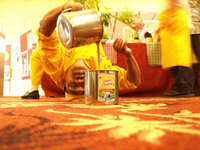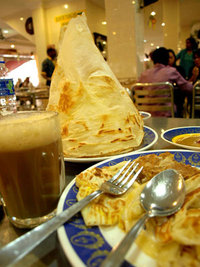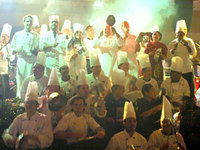Once known as “The Most Remote Village in the British Empire”, Bario stages the best food festival in Borneo. Reachable only by plane unless you are a very brave jungle trekker, it is a true breath of fresh air.
Natural Foods vs GMOs & Health at Ubud Food Festival
Food source and its impacts are as important as using consumer power to influence food ethics. Such views make up the political hot potatoes at Ubud Food Festival 2017, reports Kayti Denham for Gaia Discovery.
Bali, 15 June 2017. This year’s Ubud Food Festival, delicious as always, entertaining as ever, had an underlying current to it that was as pervading as that secret ingredient that chefs never share. In surprising and unsurprising ways, things were getting political.
Diana Von Cranach is a well-known face on the Bali food circuit, with her beautiful Northern Bali retreat Puri Ganesha Villas, her pioneering of raw food rijsttafels and her vision and provision of rawfoods and indigenous spices. Known as one of the island’s colourful and kind eccentrics, she brings a flash of beauty and laughter to any gathering and smiles abound. As it was with the panel The Language of Spices, accompanied by three other presenters, Helianti Hilman, Manjunath Mural and Arif Springs their discussion on the history of the Spice Trade was fascinating, what made it more so was Diana’s dire warning at the end.
“The act of eating is very political. You buy from the right people, you support the right network of farmers and suppliers who care about the land and what they put in the food.”
In a clear voice, she implored the audience to support the diversity of natural foods by signing up to Sum of Us – a popular public advocacy network to protest the Monsanto’s acquisition by the giant corporation Bayer. Monsanto has already wreaked havoc with its product Round Up and this latest merger could see the unregulated use of pesticides in the mega production of genetically engineered crops. Diana warned that if we do not act now, the ability to access natural foods, food produced without some form of interference will be greatly diminished. In a world where many struggle to survive the idea of ever available, viable crops may seem like a dream come true, the reality is that it has a far, far darker side.
Handcrafted cheeses with local flavours such as durian at the Ubud Food Festival 2017
That side was presented by Tri Sutrisna, an emerging star of last year’s festival, in Artisanal vs Artificial an interactive tasting workshop that highlighted the work of his Balinese farming cooperative Wanaprasta. This cooperative now represents hundreds of Balinese farmers and produces fine charcuterie and cheese products using traditional and creative applications of process ( including his amazing durian cured cheeses!! ) and pitted these productsagainst the ‘commonly found’ supermarket products.
Tri Sutrisna shares the spirit of farming and healthy food movement in the cooperative Wanaprasta of Bali.
The workshop began with a presentation on the production methods that began benignly enough, yes, we understand that a chicken that lives in the open air is going to have a better life than one in a coop, but what was revealed is not just that your average chicken for consumption is cooped up, it is also dosed to its blind eyeballs on drugs, pumped with chemicals and contained in a way that is cruelty in the extreme.
The list of ingredients that go into chickens, pigs and cows developed for meat is scary. Never mind the antibiotics, think for a moment about the chlorine baths and the bleaches to make that meat smooth and e.coli free and then imagine this, supermarket seafood is being fattened by the use of a suspected neurotoxin Sodium tripolyphosphate. It got a little mind boggling so it was something of a relief when Tri turned to the practical aspect of his presentation and invited us to try for ourselves the obvious benefits of eating well-cared-for life stock and naturally processed cheeses.
It was not strange that by this time no one was helping themselves to the alternatives of frankfurters, bacon and chicken nuggets that Tri had brought along to offer in contrast.
Politics of another nature was also in the air when Dylan Jones of Bo.Lan spoke to Gaia Discovery of the much-protested recent decision of the Thai Government to clean up the street food stalls of Bangkok’s inner city. Dylan had caused a little controversy in his adopted home city when his comments in the press were interpreted to be going against the fandom that surrounds the ubiquitous trade in street cuisine. Rather than being against it, he implied, that with regulation street food could be better, healthier and yes, while street food is a huge part of Thai daily life, shouldn’t it at least have the opportunity to be a healthier part, a cleaner part and more nutritious part?
Dylan explained that many of the ‘street food vendors’ are no longer actually making their food, rather they are buying it bulk, prepared from larger ‘wholesalers’ , cutting corners on costs to keep prices down and taking the quality down with them. This was cause for reflection what if by protesting the regulation of street food entire cities are being surreptitiously fed horrendous amounts of unregulated drugs and chemicals by a power crazed despotic leader - and that kickstarted a bleak dystopia where citizens become zombies without a voice, mute and unprotesting leading meagre lives of unclear meaning in urbanised industrial estates providing only the means for others to gain power, wealth and global dominance.
A nightmare of gargantuan proportions loomed, so to better the view a visit to the cocktail class was in order. And there under the stage lights was the most charming, non-verbal political protest of all. The young men of Locavore’s Night Rooster were wearing especially made t-shirts that noted their support of the recently jailed Governor of Jakarta.
Solidarity is in the kitchen… thank you Ubud Food Festival!
About the Ubud Food Festival
Founded in 2015, the Ubud Food Festival is a three-day culinary adventure that celebrates the archipelago’s rich culinary heritage and the entire spectrum of its food industry, from farmers and producers to world-class chefs and restaurants.
Ubud Food Festival is a major annual project of the Yayasan Mudra Swari Saraswati, with a vision of enriching the lives of Indonesians through community-building and cultural programmes.
Photos by Kayti Denham.
If you like this article, why not receive Gaia Discovery bimonthly eNewsletters that bring you stories for free? Subscribe to Gaia Discovery here.
Lip Smacking Malaysia Gourmet Festival

Back flip pulled tea
A trip to Malaysia will not be complete without sampling its authentic cuisine, and there are quite a few, from breakfast to late night supper, the latter to serve as essential tummy liners to pub-crawlers.
Even in the heart of Kuala Lumpur city, you might stumble upon a few finds. Like the mamak (or Indian) shops for hot, crispy roti canai (made of wheat flour, egg and ghee, this is also known in Singapore as roti prata) served with a choice of chicken, fish or dhal curry. Malaysians add a dollop of spicy sambal (chilli paste) in the curry and use their fingers to eat the bread.
Nasi Kandar Pelita along Jalan Ampang and opposite of Chorus Hotel is consistently good with its fast food rendition of Indian Muslim food which includes variations of roti canai (plain, tissue, bom, with egg, banana or shredded meat), all interesting and downright tasty.

Roti canai in different varieties
Mamak shops serve the popular teh tarik, literally known as pulled tea, which gives it the tantalising froth. Mr Moor Sazali, at the opening of the Malaysian International Gourmet Festival, drew gasps from 2,000 VIP guests as he twisted, twirled and even bent backwards yoga like to create frothy goodness.
Dollops of Malaysian Cuisine
Indeed, this celebration of food is no storm in a teacup for the Malaysian authorities that are bent on spreading the fame of local cuisine to the rest of the world. This includes issuing RM200 million worth of loans pooled to fund restaurant proprietors and investors in setting up bases outside the country.Malaysia has over 350 restaurants operating globally and this is to be upped to 8,000 by year 2015 to forge a stronger gourmet destination identity.
"The challenge is to develop a pool of Malaysian chefs and to export them to the world," said Mr Mohd Rosly Selamat, the chief operating officer of Pempena, a wholly-owned subsidiary of Tourism Malaysia. Mr Selamat shared that an existing programme exists which invites overseas chefs to Malaysia where they get to sample and prepare local dishes. Malaysia Kitchen intends to promote gastronomic by-products such as sauces and condiments to the world, plus local culture and handicrafts (tableware, décor and music) through these restaurants.

Chef Ismail
Thirty restaurants participated in the month-long international gourmet festival beginning 2 November 2007, which is a step up from a mere 13 in 2001 when it first started. A Malaysia Truly Asian Cuisine showcase saw master chefs dabbling with local ingredients to create a dish that would typify Malaysia.
A definite step in the direction of savouring Malaysia’s heritage I say, as I help myself to another serving of Nescafe tarik (pulled coffee).
Heritage Tantalizes Tastebuds
More can be done, though, like profiling more authentic Malaysian restaurants in tourist literature and websites, banning the use of meat from endangered sources such as shark’s fin especially during gourmet festivals and encouraging local chefs to uphold traditional ways of food preparation and presentation.
Cuisines like and Aunty Aini’s Cafe, Rebung and Enak go a long way in restoring old - in some cases, dying - practices. Authentic dishes are environmental friendly too as ingredients are prepared using manual means and handmade tools as opposed to electrical appliances.
Chef Ismail of Rebung restaurant uses his grandmother’s old coconut grater in his restaurant, partly for sentimental reasons, and the other, to extract the best flavour from the fruit. "Food tastes better when prepared with love," he quipped.

Chefs making music
Give a Thought to the Environment
In authentic Malay cuisines, local produce is used most of the time, depending on seasonal harvests. Meat is gotten from local farms such as the kampong chicken that are free to roam and grow naturally. And where the only steroid used is sunshine.
Eating fresh is one thing. Not buying foreign produce means saying no to mass and over production - what we often see rows after rows of packed frozen and chilled goods in supermarkets. Frozen products also use up more energy in packing, storage and transportation.
If we switched to eating fresh at least half the week by way of buying from the local market or growing own vegetables and herbs, supermarkets would stock up half of existing supplies, there would be fewer cargo flights, fewer delivery trucks on the roads, less exploitation of land for farming, and less carbon and methane emissions.
Returning to basics, going back to simplicity and revisiting age-old practices is something everybody should seriously consider, especially the organisers of the next Malaysian International Gourmet Festival. It will be gentler on Mother Nature, and certainly gentler on our health.
Make a date to visit Malaysia during 2008 Malaysian International Gourmet Festival that takes place all around the country during 1-30 November. Visit www.migf.com for details.
Potos by Mallika Naguran.

